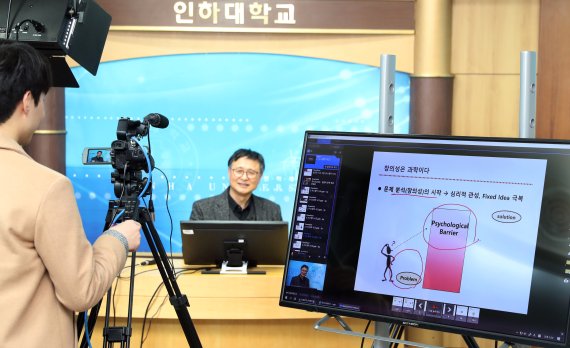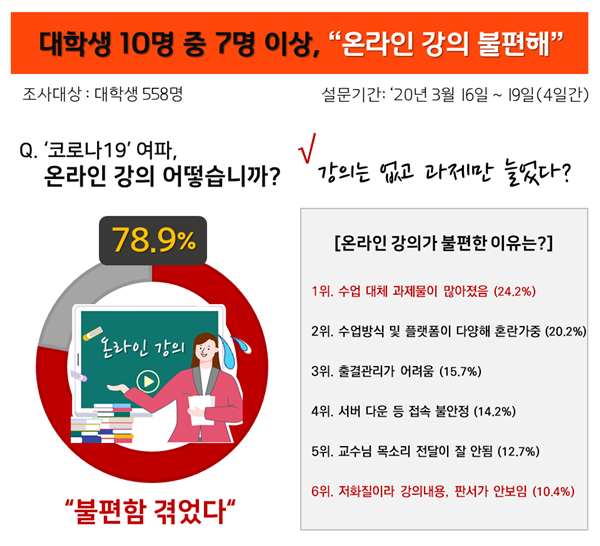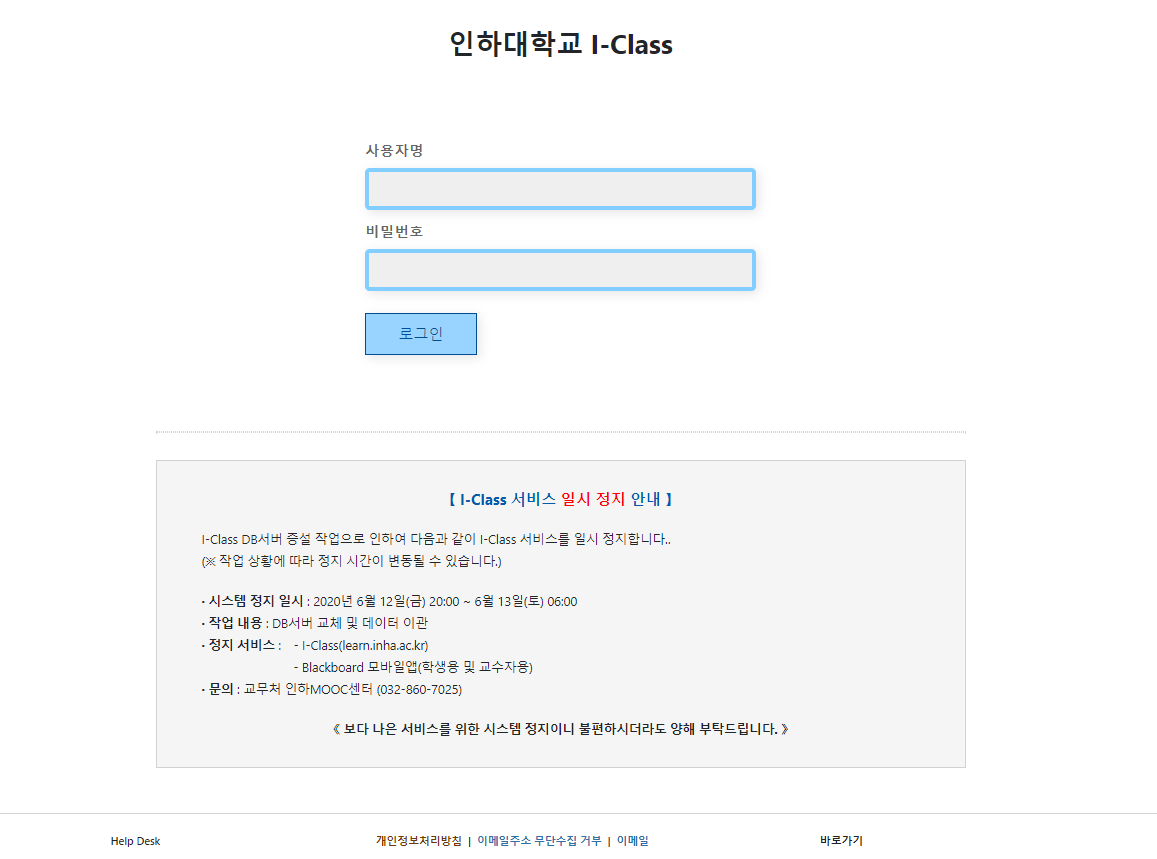 |
COVID-19 has hit not only Korea but also the entire world. This virus changed our way of living quite a lot. As a part of social distancing, universities delayed or canceled offline face-to-face lectures and switched to online non-face lectures in the first semester of 2020. However, unprepared online lectures were problematic in many ways. Let's take a look at what kinds of problems are happening in online lectures and what actions are being taken by universities.
What are Online lectures?
An online lecture is a type of distance-learning course that use the Internet to teach. It is mainly called E-learning` Recorded lectures are posted on education sites for students to find. It also provides real-time streaming. E-learning is a learning method that enables students to learn at anytime and anywhere, using laptops, smartphones, and tablet PCs through a variety of online platforms including Blackboard, YouTube, and Zoom. Unlike the traditional classroom approach, where students take lectures in the classroom and do homework at home, students can study the materials provided by the professor before class> In this type of class, they are able to have a new approach to discussion, problem-solving, and other learning activities.
In particular, E-learning is in the limelight because of the circumstances in which social distancing is needed to prevent COVID-19. From students’ point of view, they can learn outside of the limited space of school anytime and anywhere. Also, E-learning has various advantages, such as students being able to study on their own initiative and with flexibility. They can aslo take lectures from outstanding faculty members nationwide and globally.
On 8 December 2019, an unknown case of pneumonia was diagnosed at a medical institution in Wuhan, China, and COVID-19 was confirmed and published on 31 December 2019. Since then, COVID-19 has been spreading all over the world, and as of May 23, 2020, Korea has also had 11,165 confirmed cases. To prevent the spread of COVID-19, the government implemented social distancing from March 22, 2020. Thereby, un-tact culture in various fields such as distribution, art, finance, and education needed to be diffused. Un-tact culture is a combination of contact and negation, which means work without contact. Universities also postponed offline courses and switched to online classes as a part of social distancing. Through E-learning, students and professors can study without facing each other. On May 12, 2020, the Korean Association of private university presidents surveyed 193 universities across the country: Scheduled Date of Face-to-face Classes. 85 universities out of 193 universities decided to run online classes until the COVID-19 calms down, while 80 universities run online classes for the entire semester. Soon more than 86 percent of universities decided to run the first semester online. Inha University also postponed its opening by two weeks. Lectures were begun on March 16 as an online lecture temporarily, and after collecting opinions from students and professors, it was finally decided on May 1, that the entire semester would be held online. Some practical subjects were restrictively allowed in face-to-face lectures, but after the outbreak of confirmed COVID-19 cases from Clubs in Itaewon, the plan was changed, from May 14, to have full-time classes at home, and the date of resumption of off-line classes has not yet been decided.
Many universities now offer online lectures as a benefit of non-face to face lectures, but the lack of preparation creates a lot of noise.
The Negative effect of the online lecture
The first negative effect is a violation of the rights of learning. The deterioration in the quality of online lectures has become a problem, leading to a violation of the rights of learning. According to the Financial news article, Professor B of Kyung Hee University had to upload 17 lectures according to the lecture plan, but only four lectures were uploaded. Students were dissatisfied because there were no lecture announcements, no answer to student inquiries, or response to any protest emails. Kyung Hee University staff member mentioned that “the professor`s delay in uploading lectures caused the problems, we added an assistant to the professor and posted the lecture again.” Other media inquiries into the university's student council found dozens to hundreds of problems with online lectures. The job portals Incruit and Albacall surveyed 558 university students about their online lectures, and 78.9% said they felt uncomfortable with their online lectures. Details included "Difficulty to manage attendance" (15.7%), "Can't hear the professor's voice" (12.7 %), and "It's hard to check the lecture content and the writings because the video quality is low." (10.4%). Due to the non-facial characteristics of the program, some students did not concentrate on lectures. Even if students did not take lectures properly, they did not receive any sanctions. Also, there were many cases that methods of taking attendance were replaced with solving the problems, resulting in lower academic achievement. For example, students admitted to attendance as long as they solve the attendance question without taking lectures completely but there's no way to make sure they’re taken the class properly. Also, there sometimes are failures to properly followthe lecture hours and students have to spend more time than the scheduled hours, which could affect subsequent subjects. In an interview with Weekly Dong-A, H, an architecture major at Kyung Hee University, said that “Although one major lecture is three hours long, it usually takes five or six hours and sometimes if it lasts for seven hours, but I should keep listening because I don't know when the pop quiz will happen.”
 |
Also, experimental and practical subjects are limited in learning with only online lectures. Providing lab tools and material for each student is financially limited. Indeed, students also need a place to practice, but it is difficult to practice at home. In an interview with Hankyoreh, a piano major at a music college in Seoul said that “recording and video calls cannot include the quality of the sound because of technology limitations, so the quality of lessons drops considerably.” To make up for this, when the COVID-19 calmed down, most universities was going to open face-to-face lectures with a limited number of students in specific departments. However, as the number of confirmed cases from the Club of Itaewon spike, many students were demanding the cancellation of face-to-face lectures, fearing that the COVID-19 could spread to universities.
The second problem is the lack of online infrastructure. Lectures were postponed because of COVID-19, but as of March 16, 2020, most universities decided they could no longer postpone the lecture. So, they decided to open the semester online. After the decision was made, Inha University took preemptive measures such as establishing more online lecture servers to prevent downed servers. However, the server went down on the opening day of the semester, causing inconvenience to students. Similarly, on the first day of the mid-term test at Chonnam National University a related server was down from an unknown error, caused rebooting of the server, so the test was suspended for about 30 minutes. Approximately 30 online exams were held on that day, and some of the 127 students who took the online exam for two subjects at that time were unable to submit their answer sheets. Just after the server was restored, added test time was given to students. However, the announcement about the added time was made after the exam was over, and the extra time that was given was only 10 minutes shorter than the original exam time. Chonnam National University staff said, “We are trying to determine the cause of the server glitch now, and other online exams were underway without any problems. If a similar problem occurs, we will take measures to prevent the students from being disadvantaged.”
 |
The third problem is how to evaluate the results of students’ academic achievement. Most universities, including Inha University, had announced their results in an absolute evaluation method because it is difficult to evaluate the results of their study activities. However, at some universities, students were opposed because some universities wanted to keep their relative evaluations. The emergency committee chairman of Hanyang University's student council said that “We demand absolute evaluation because if absolute evaluation is not carried out, students will feel a sense of deprivation, and there will be distrust students, and between professors and students. But Hanyang University kept relative evaluation for students who studied sincerely. They said that if they detected any kind of cheating, they would punish the students according to the school regulations. Besides, there are some universities that announced that they would score by absolute evaluation but, did not show any specific evaluation methods or points. So, many students were worried about universities changing absolute evaluations into relative evaluations which are its appearance only.
The last problem is the inconvenience for disabled students. Disabled groups filed a petition with the National Human Rights Commission of Korea on March 20, 2020, claiming that deaf students are not guaranteed a learning environment when taking online classes. According to Academyinfo, 4,566 disabled students were enrolled in universities nationwide in 2019. However, there usually are no subtitles for videos in online lectures, and many professors did not provide materials for disabled students, suggesting that it was difficult for disabled students to attend classes like their classmates. Subtitling services are currently provided for convenience in videos such as online lectures but are not mandatory. Because the real-time subtitle service requires a separate budget, it is up to the school to decide. Lee, a student at Korea University who has a hearing problem, said, “It's hard to grasp the contents of the monitor screen by looking at the shape of the mouth. I don't know how long I have to listen to online classes, and I don't know if I can understand them properly.” Kim Kyung-mi, a social welfare professor at Soongsil University, said, “Hearing-impaired students can't take online classes without additional help. We need help from universities by hiring stenographer for class contents.”
Request refund for tuition due to the online lecture
The Nationwide school council network said “In our signature campaign only 6.8 percent of the students were satisfied with the online lectures, which took place after the start of the first semester of 2020. This adds evidence to the status of violation of the right to study. Also, among 21,784 university students nationwide, 21,607 (99.2 percent) answered that they need to have their tuition money returned in the first half of the year in a five-day survey from April 15 to April 19 this year. Students demanded measures to deal with online lectures and return tuition money. Related to the tuition fees are more than 10 public petitions have been filed to demand that university students are paid back part of their tuition fees. Among them, the petition, titled “Request to Lower the tuition Fee by Postponement of University semester,” received 138,378 signatures as of April. Lee Da-hoon, a senior in the department of materials engineering at Inha University, filed a petition with the Constitutional Court, claiming that it is unconstitutional that the Ministry of Education did not create a regulation to reduce tuition fees if universities failed to proceed proper educational services under the exceptional circumstances of non-face to face classes.
On April 9, 2020, the Ministry of Education, and the Korean Council for University Education (KCUE) started the discussion about refunding tuition fees. KCUE said, “Universities cannot afford to refund the tuition fees because of a freeze on tuition fees” and proposed a plan to refund part of tuition fees by utilizing the budget for university innovation support projects provided by the Ministry of Education. The Ministry of Education answered “We understand the purpose of the project, but it is difficult to use the budget for the university innovation support projects for a different purpose from the purpose of the project.” Universities are insisting that there is no legal basis for refunding tuition fees as the semester is being held through online lectures. At a plenary session of the National Assembly's board of education, Deputy Prime Minister for Economic Affairs and Education Minister Yoo Eun-Hye avoided responsibility and said, “It is up to the university presidents to decide whether to refund tuition.” Under these circumstances, the law firm ‘Light’ said on its blog that we will file a lawsuit against universities nationwide to claim tuition refunds from April 25, 2020, and will recruit participants. They insisted that the universities have suffered virtually no damage and have reserves of tens of billions of won. They also said that only students suffered damage and the universities should share the pain. They hoped that the Ministry of Education and each university will change their positions and settle the case without litigation.
 |
Although there are such problems, some universities are making efforts to solve the problem. Let's see what kind of efforts they have made.
Universitys’ measures and efforts for the online lecture
The first example is Chosun University`s effort to help disabled students. The student support center for disabled people run by Chosun University has gained positive responses in its response to the recent COVID-19 situation. Since it opened in 2009, the university offer a variety of bachelor's degree support services to try to improve awareness of disabled people, to guarantee the right of students with disabilities to study, , and to improve the quality of their lives. The center does weekly checks on 42 disabled students according to their progress and supports them individually. The center also made additional budgetary arrangements for hearing-impaired students who are have trouble with online lectures. The center bought access to the AI real-time subtitle provision auxiliary engineering program called ‘SOBORO.' For students with disabilities, a disabled student helper (volunteer labor scholarship student) helps to produce alternative material and executes tasks so that visual lecture material can be converted into text and learned with auxiliary equipment such as Braille information terminals.
Secondly, Inha University conducted a student satisfaction survey on online lectures from April 22 to 23. Of the 9,727 people surveyed, 6,252 (64.3%) wanted to attend online classes for the rest of the semester, so it was decided that the first semester would be online. The MOOC Center of Inha University has set up an online bulletin board to share its lecture know-how for professors and is supporting the production and operation of well-made videos. The details are mainly about how to teach on Zoom and YouTube in real-time online, and the professors will share their know-how. When lectures began entirely online, Inha University made the online bulletin board for dealing with the inconveniences of in-online lectures and Q&A/FAQ. This is made to promptly resolve complaints and problems with online lectures.
 |
we conduct an interview with the relevant department at Inha University.
The Inha Times(IT): Is it difficult at the university itself to pay back tuition?
Inha University: The university knows that the students want to be paid back their tuition fees. However, because of the COVID-19, we are facing difficulties financially, with no income. The government is also seriously considering the issue of refunding tuition fees. The government also knows that this issue will not be resolved at the university itself.
(IT): Any plans on the return of tuition?
Inha University: Nothing has been decided yet, but it does not mean that the university won't return tuition fees. The Ministry of Education and the 21st National Assembly are discussing this issue. We are closely watching the government's position.
(IT): There were confirmed cases from the Club of Itaewon spike, and our university also had outbreak of confirmed cases. Will the final exams be held offline?
Inha University: If the COVID-19 gets worse and becomes a problem again, the university will hold a committee meeting. For example, we will hold a committee meeting this week (the last week in May) to decide on offline lectures next week. If offline lectures are possible, offline tests are also possible.
(IT): What will the university do if quality problems occurred in the lectures?
Inha University: The school cannot know what problems occurred in the lecture. So we have received the complaints through Inha Plaza to find out the problems. When complaints are received, we investigate the problems in detail. We will endeavor to ensure that the students and the teachers concerned reflect their opinions sufficiently.
There is a proverb, “Change the crisis and it's become a chance.” If the university takes this opportunity to make up for the deficiencies of online lectures, we will be able to use online lectures in a variety of ways. I hope that online lectures can be used in a variety of ways so that you can attend them more cheaply and better.
안찬현 12173396@inha.edu
<저작권자 © 인하프레스, 무단 전재 및 재배포 금지>

![[보도] 제43대 총학생회 후보자 공청회 개최돼](/news/photo/202404/11686_5015_2626.png) [보도] 제43대 총학생회 후보자 공청회 개최돼
[보도] 제43대 총학생회 후보자 공청회 개최돼
![[보도] 제43대 총학생회 후보자 공청회 개최돼](/news/thumbnail/202404/11686_5015_2626_v150.jpg)
![[보도] 총학생회장 선거 열려···학생사회 대표자는?](/news/thumbnail/202403/11668_5014_266_v150.jpg)
![[보도] 무전공·계열제 논의···학생은 어디에?](/news/thumbnail/202403/11666_5011_2238_v150.jpg)
![[보도] 인하 70돌, 다양한 행사 이어져](/news/thumbnail/202403/11663_5009_165_v150.jpg)
